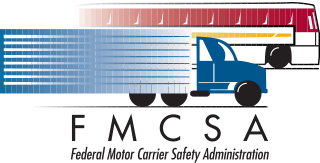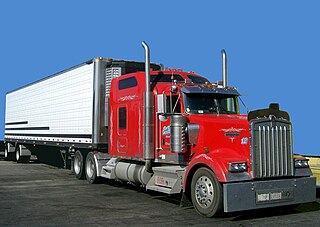Bicycle law in California is the parts of the California Vehicle Code that set out the law for persons cycling in California, and a subset of bicycle law in the United States. In general, pretty much all the same rights and responsibilities that apply to car drivers apply to bicycle riders as well.
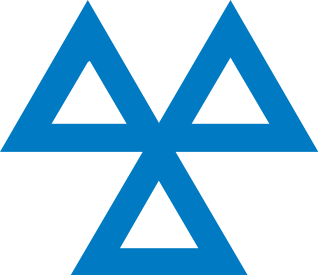
The MOT test is an annual test of vehicle safety, roadworthiness aspects and exhaust emissions required in the United Kingdom for most vehicles over three years old used on any way defined as a road in the Road Traffic Act 1988; it does not apply only to highways but includes other places available for public use, which are not highways. In Northern Ireland the equivalent requirement applies after four years. The requirement does not apply to vehicles used only on various small islands with no convenient connection "to a road in any part of Great Britain"; no similar exemption is listed at the beginning of 2014 for Northern Ireland, which has a single inhabited island, Rathlin.

The Ministry of Transportation of Ontario (MTO) is the provincial ministry of the Government of Ontario that is responsible for transport infrastructure and related law in Ontario. The ministry traces its roots back over a century to the 1890s, when the province began training Provincial Road Building Instructors. In 1916, the Department of Public Highways of Ontario (DPHO) was formed and tasked with establishing a network of provincial highways. The first was designated in 1918, and by the summer of 1925, sixteen highways were numbered. In the mid-1920s, a new Department of Northern Development (DND) was created to manage infrastructure improvements in northern Ontario; it merged with the Department of Highways of Ontario (DHO) on April 1, 1937. In 1971, the Department of Highways took on responsibility for Communications and in 1972 was reorganized as the Ministry of Transportation and Communications (MTC), which then became the Ministry of Transportation in 1987.
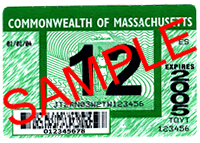
Vehicle inspection is a procedure mandated by national or subnational governments in many countries, in which a vehicle is inspected to ensure that it conforms to regulations governing safety, emissions, or both. Inspection can be required at various times, e.g., periodically or on the transfer of title to a vehicle. If required periodically, it is often termed periodic motor vehicle inspection; typical intervals are every two years and every year. When a vehicle passes inspection, often a sticker is placed on the vehicle's windshield or registration plate to simplify later controls, but in some countries—such as the Netherlands since 1994—it's no longer necessary. Inspection stations are places to drive inside to see if a vehicle passes inspection once a vehicle is due for inspection. Most US inspection decals/stickers display the month's number and the year.
The Professional Truck Driver Institute (PTDI) is a non-profit organization that provides certification of training courses for drivers of commercial motor vehicles. It was formed in 1986 during the standardization of commercial driver's licensing by the Federal Motor Carrier Safety Administration in the United States. Its management was taken over by the TCA in 1996. PTDI is the first nonprofit organization to develop uniform skill performance, curriculum, and certification standards for the trucking industry and to award course certification to entry-level truck driver training courses and motor carrier driver-finishing programs.
PrePass is an intelligent transportation system (ITS) service developed by Lockheed Martin that electronically verifies the safety, credentials, and weight of commercial vehicles at participating state highway weigh stations. Because they comply electronically, commercial carriers enrolled in PrePass are authorized to bypass these facilities rather than pull in for manual inspection.

In the United States, driver's licenses are issued by each individual state, territory, and the District of Columbia rather than by the federal government because of the concept of federalism. Drivers are normally required to obtain a license from their state of residence and all states recognize each other's licenses for non-resident age requirements. A state may also suspend an individual's driving privilege within its borders for traffic violations. Many states share a common system of license classes, with some exceptions, e.g. commercial license classes are standardized by federal regulation at 49 C.F.R. 383.

In Canada, driver's licences are issued by the government of the province or territory in which the driver is residing. Thus, specific regulations relating to driver's licences vary province to province, though overall they are quite similar. All provinces have provisions allowing non-residents to use licences issued by other provinces and territories, out-of-country licences, and International Driving Permits. Many provinces also allow non-residents to use regular licences issued by other nations and countries. Canadian driver's licences are also valid in many other countries due to various international agreements and treaties.

Hours of Service (HOS) regulations are issued by the Federal Motor Carrier Safety Administration (FMCSA) and govern the working hours of anyone operating a commercial motor vehicle (CMV) in the United States. These regulations apply to truck drivers, commercial and city bus drivers, and school bus drivers who operate CMVs. These rules limit the number of daily and weekly hours spent driving and working, and regulate the minimum amount of time drivers must spend resting between driving shifts. For intrastate commerce, the respective state's regulations apply.
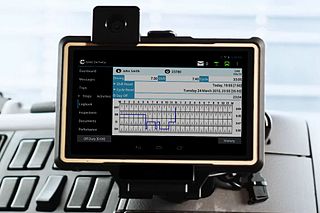
An electronic on-board recorder (EOBR) is an electronic device attached to a commercial motor vehicle, which is used to record the amount of time a vehicle is being driven. This is similar to the tachograph, and is the American equivalent of the digital tachograph used in Europe. Trucks in the European Union are required to have digital tachographs installed, and are securely monitored by government agencies. However, in Europe, the new digital tachograph which is considered secure, can be tricked with a round magnet placed by drivers over the connection to the transmission box. Usually they tie a rope to that magnet, and with a simple pull, the magnet will disengage and will show that the driver started moving about half an hour ago . The majority of carriers and drivers in the United States currently use paper-based log books. On January 31, 2011, the U.S. Federal Motor Carrier Safety Administration (FMCSA) proposed a rule requiring Electronic On-Board Recorders for interstate commercial truck and bus companies. The proposed rule covers interstate carriers that currently use log books to record driver's hours of service. The proposal would affect more than 500,000 carriers in the United States and carriers that currently use time cards would be exempt.
The motor carrier safety rating is an evaluation given to an interstate commercial motor carrier by the Federal Motor Carrier Safety Administration (FMCSA).
The Highway Traffic Act (HTA) is an Ontario Act which regulates the licensing of vehicles, classification of traffic offences, administration of loads, classification of vehicles and other transport related issues. First introduced in 1923 to deal with increasing accidents during the early years of motoring in Ontario, and replacing earlier legislation such as the Highway Travel Act, there have been amendments due to changes to driving conditions and new transportation trends. For example, in 2009, the Act was revised to ban the use of cell phones while driving.
Vehicle inspection in Australia is done on a state basis. Each state or territory has the authority to set its own laws pertaining to vehicle inspections, all have some form of inspection, either periodically or before a transfer of ownership.

DEKRA is a European vehicle inspection company founded in Berlin, Germany in 1925 as Deutscher Kraftfahrzeug-Überwachungs-Verein. With approximately 36,000 employees and revenues of roughly €1.9 billion, DEKRA is the largest inspection company in Germany and the third-largest in the world. By its own account, it is the European market leader. The group focuses on the inspection of vehicles and technical systems, but also offers other services. DEKRA has had its headquarters in Stuttgart since 1946. Business operations are carried out by DEKRA SE, which is wholly owned by DEKRA e. V.
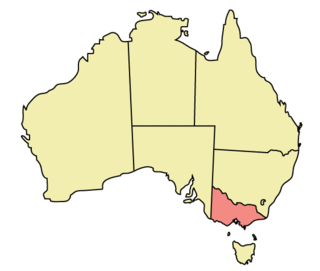
The Accident Towing Services Act 2007 is a law enacted by the Parliament of the State of Victoria, Australia. The Act is the prime statute regulating the vehicle towing industry which provides towing and recovery services for light and heavy road vehicles across Victoria. It is predominately founded on safety and consumer protection sentiments. The Act continued economic controls over the industry and contains occupational regulation characteristics. The style of the underlying regulatory scheme varies in parts and represents a blend which is prescriptive in some parts and performance and process-based in others.

A driver's license is an official document, often plastic and the size of a credit card, permitting a specific individual to operate one or more types of motorized vehicles, such as a motorcycle, car, truck, or bus on a public road.
The White-Miskill Act for Parasailing. is a law enacted by the legislature of the State of Florida in 2014 for the control of the sport of parasailing. It relates to commercial and recreational water activities prohibiting certain water activities within some areas and specifies the requirements for the operator of a vessel engaged in commercial parasailing.
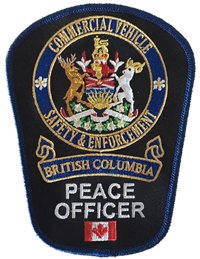
British Columbia Commercial Vehicle Safety & Enforcement (BCCVSE) is a provincial law enforcement agency that is responsible for the compliance and enforcement of the commercial transport sector, protection of the environment and transportation infrastructure of British Columbia, increasing road safety and protecting the motoring public.
